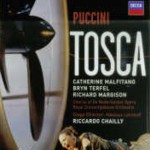This performance, from the Netherlands Opera, was taped in 1998 but just released. It was worth waiting for. Tosca is set specifically in June, 1800, in Rome; references are made to particular historical occurences in the course of the opera. For that reason producers and designers rarely fiddle with it–mainly it has escaped the mauling of regietheater (director’s or producer’s theater) unlike, say, its cousin Madama Butterfly, one recent production of which took place in dirt, with “real” insects. And all Toscas tend to look the same–explicitly, the acts take place in the church of Sant’Andrea della Valle, an apartment in the Palazzo Farnese and the top of the Castel Sant’Angelo, but less specific interiors of churches, large drawing rooms in palaces, and the roof of a grand building will suffice.
Here we have a different view, from a director who likes to shake things up, at times successfully (his Parsifal and Lohengrin, for example). Nikolaus Lehnhoff sees in the opera that “existence has become the human death-trap” and Scarpia is the Antichrist. Raimund Bauer’s sets back up the concept: The first act takes place in a “sacred space”, with mammoth, pillar-like candles and a huge painting of “The Last Judgment” looking over the action that Scarpia dominates; the second act is a futuristic dungeon with secret doors, a turbine engine, and a staircase that withdraws so that Tosca’s escape is almost foiled; the last act portrays the Castel Sant’Angelo as a huge bunker over the city with no light or vista, a hideous jail with the turbine engine turning inexorably overhead. Falk Bauer’s costumes are wonderful–Tosca is a very sexy woman indeed–and Scarpia’s henchmen, in silver-gray with silver-gray hair, are futuristic-scary. This Tosca is all about cruelty and darkness, a claustrophobic view of the opera that is as effective as it is creepy.
Those familiar with Catherine Malfitano’s 1993 on-location-in-Rome video of the role of Tosca know her passion for and commitment to the part. She is just as fine here; perhaps her vibrato has loosened a bit (and she does not look like a particularly young diva), but few of today’s sopranos can inhabit the part the way she does. Her jealousy, love for Cavaradossi, loathing for Scarpia, and overall terror in the second act are vivid and real.
Richard Margison is the Cavaradossi. His rock-solid voice and technique do well by him, but his is a generic portrayal, with little imagination in the soft passages and a general lack of familiarity with the language’s subtleties. Both of his arias are well sung. He never detracts from the show, but you can imagine what a truly involved, Italianate tenor might have added.
The cast’s centerpiece is Bryn Terfel’s Scarpia. Snide, sure of himself whether petting a kitten or attempting to pet Tosca, sadistic, he strides like a concentration camp commandant through the first act and slithers through the second. Whether in full-length leather coat or bizarre silver trousers and vest, he presents a huge, terrifying figure, both physically and vocally. His voice can caress cunningly, and it can frighten while it is caressing. Cynical and perverse, his is an unforgettable Scarpia. Mario Luperi is an urgent Angelotti, and Scarpia’s little helpers are a nasty bunch.
Kudos to Riccardo Chailly, not afraid to take the Te Deum at a dangerously slow pace so that Scarpia’s blasphemy seems all the more malignant, with the Te Deum itself like a death march or satanic ritual. Throughout the opera he knows when to linger over tender moments so that when the emotional pressure returns it is felt even more strongly. The Royal Concertgebouw Orchestra sounds glorious. Just when you thought you’d never need another Tosca on video, along comes this one and pushes the competition out of the way.
There is a documentary with interviews with Lehnhoff and Malfitano. Picture and sound (LPCM stereo and 5.1 Surround) are superb and the direction for the small screen is wise and effectual. Subtitles are in all major European languages plus Dutch and Chinese. [10/22/2007]
































